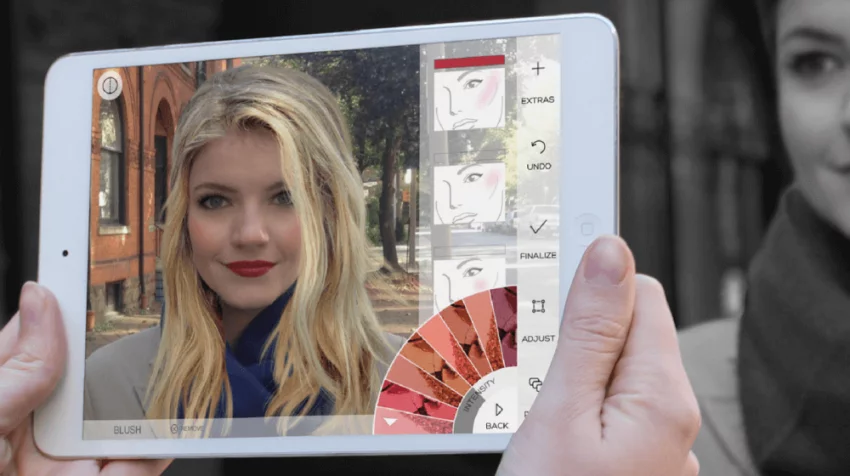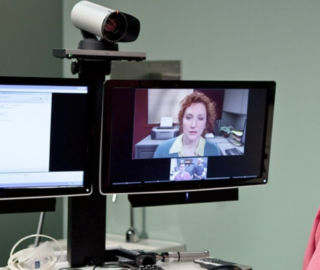
Reuters referenced an Orbis Research figure estimating the global cosmetics market to be worth around $$805.61 billion by 2023.
According to the research, products for skin care, hair care, and fragrances are the most-sold products online. Skincare has the largest market share currently, while oral cosmetics will be the fastest growing sector during the forecasted period. The research also predicts that companies will increasingly sell products via eCommerce sites, revealing that orders via smartphone rose to $1.53 billion in 2017.
We researched the use of AI in the beauty and cosmetics industry to better understand where AI comes into play in the industry and to answer the following questions:
- What types of AI applications are currently in use in the beauty and cosmetics industry?
- What tangible results has AI driven in beauty and cosmetics?
- Are there any common trends among these innovation efforts? How could these trends affect the future of the skincare and makeup sectors?
With the help of artificial intelligence and machine learning, beauty and cosmetics companies are exploring the possibilities. This article intends to provide business leaders in the beauty, skincare, and cosmetics space with an idea of what they can currently expect from AI in their industry. We hope that this report allows business leaders to garner insights they can confidently relay to their executive teams so they can make informed decisions when thinking about AI adoption. At the very least, this report intends to serve as a method of reducing the time business leaders in this industry spend researching AI companies with whom they may (or may not) be interested in working.
This report covers vendors offering software using three AI-based technologies:
- Recommendation Engines
- Augmented Reality and Virtual Mirrors
- Natural Language Processing

Recommendation Engines
Proven Skincare
Proven Skincare is a consumer app that uses machine learning to create individual skincare regimens based on a customer’s unique skin type.
The company states that the recommended regimen is based on their Beauty Genome Project, a database of more than 8 million customer product reviews, 100,000 skincare products, and 20,000 ingredients, as well as information from scientific or peer-reviewed journal articles about skin and ingredients.
We could not find any videos that demonstrate how the application works, but customers can start using the web-based application by first taking a quiz that asks about their skin condition, including dryness, pigmentation, acne, and elasticity. The app also asks about factors that could affect skin condition, such as age, sun exposure, race, diet, sleep habit, and activities such as work and fitness regimen.
The data collected is analyzed and compared with the application’s database. Then, machine learning algorithms match the customer’s unique skin profile and suggest a skin care regimen.
For instance, the algorithm could take the quiz data of a woman from the Philippines who runs often and matches it with information about products and ingredients for people with brown skin, living in the tropics, and usually exposed to the elements.
The product formulations are driven by millions of data points to ensure that ingredients are correctly matched to the customer. Products that comprise this regimen are custom-made by the company. If the customer agrees to purchase Proven Skincare’s products, the customer’s quiz data is given to a cosmetic chemist in the company laboratory to create them.
The company has not made any case studies available but features testimonials on its website. The company has raised $120K in funding from investors such as Justin Mateen, Z Nation Lab, and Soma Capital, among others.
Amy Zaoshi Yuan is Co-founder & CTO at Proven Skincare. Prior to this, she was the data scientist lead at Lyra Health and data scientist at McKesson. She also served in research roles at Stanford University School of Engineering and University of Southern California, where she earned her PhD in Computational Physics.
Function of Beauty
Function of Beauty is an application developed by its namesake company that offers customized shampoo and conditioner to customers. The company claims that the application uses machine learning algorithms to develop the custom shampoo formulas based on customers’ hair type and the treatments it needs such as conditioners, waxes, and oils.
To start the recommendation, customers need to answer the survey about their hair type, hair structure, scalp moisture, fragrance preferences, shampoo and conditioner color, preferred bottle size, and frequency of use. This profile enables the algorithms to find patterns in the company database and come up with matches for the customer.
Function of Beauty does not make available any demonstration videos for their software or case studies reporting success with their software.
The company does not seem to have C-level executives with deep AI background, but the company has raised $12.2M in funding from Y Combinator, Bessemer Venture Partners, and GGV Capital.
Augmented Reality and Virtual Mirrors
Coty
Coty offers an augmented reality virtual mirror software that it calls Magic Mirror. The Magic Mirror, which uses computer vision technology, was developed in collaboration with digital creative studio Holition and digital marketing company Perch Interactive. Coty claims the mirror allows customers to virtually wear products from the Bourjois Rouge Velvet Lipstick collection. Bourjois is one of Coty’s product lines.
The video below shows how the magic mirror works. Instead of tapping products from an on-screen selection, the customer needs to physically pick up a product on the display tray or shelf. This behavior activates the sensors on the mirror, while the computer vision technology virtually applies the shade of lipstick to the customer’s lips on the screen:
Coty explains that shoppers can complete their digital looks with onscreen eye makeup and blush, which is matched to each shopper’s individual skin tone.
Holition provided the AR technology for the Magic Mirror. CTO Russell Freeman holds a Master’s degree in Vision, Imaging and Virtual Environments and a PhD in Augmented Reality, both from the University College London.
ModiFace
ModiFace offers augmented reality applications that include Skin AI, an anti-aging and skin care simulation application for the beauty and medical industries. The company claims that the video-based application is able to detect and quantify changes in the ski, as well as predict changes in the skin condition after the use of a skin product.
The application was developed with the help of dermatologists to measure and assess skin conditions such as dark spots, discolorations, dryness, uneven tone, and fine wrinkles. After capturing these images, the company claims their software can simulate positive changes to the user’s skin in a video. The company claims that seeing these predictive results immediately could encourage users to stick to their skin care regimens more strictly.
Users first open the app, which then captures the user’s face through the user’s camera on their phone. The software then measures the severity of the user’s skin conditions and predicts the impact of a product on the consumer’s skin after several applications of the product. The user’s phone screen splits into a before and after video, showing the user how much a product could improve their skin condition.
The short video below demonstrates the process:
The app could be used by businesses as a monitoring device to measure the impact of a product on the customer’s skin before it is launched. It could also be used in-store to help retail customers undergo a skin care simulation before they make a purchase.
Modiface does not make available any case studies reporting success with their software but claims Allergan, L’Oreal, Unilever, Yves Rocher, and Sephora as clients. Modiface was acquired by L’Oreal for an undisclosed amount in March 2018.
Alex Levinshtein is Director of AI at ModiFace. Prior to this, he was a principal researcher at Epson, where he worked for four years. Earlier in his career, he worked at Tangam Gaming, Google and CognoVision. He holds a PhD in computer vision from the University of Toronto, where he also serves as adjunct professor at the computer science department.
Perfect Corp.
Perfect Corp. offers a smartphone application that allows customers to use augmented reality to test a variety of makeup looks.
The company claims that the application uses a combination of face detection and tracking, augmented reality (AR) and live 3D Face AR to create the different looks.
To use the application, the user must download it from the Apple or Google Play store which seems to enable the app’s computer vision algorithms to access phone’s camera. The face detection and tracking, driven by deep learning, pinpoints more than 100 focal points on the app user’s face to map the makeup onto their face as the user moves. The company also claims that its software can also detect wrinkles, spots, skin texture, and dark circles on a user’s face.
The video below demonstrates the app’s interface on a smartphone and how the user can explore various shades of makeup for the eyes, lips, and hair to create their desired look. The user can then save the look on their phone and show it to their own makeup artist to replicate at their convenience.
The company claims that downloads of its app reached 600 million in April 2018, with over 1 billion virtual makeup trials every month and over 30 million selfies taken daily.
Perfect Corp. does not make available any case studies reporting the success of their software, but claims Yves Saint Laurent, L’Oréal Paris, MAC Cosmetics, and Macy’s as clients.
Che-Ting Ho is a senior machine learning engineer at Perfect Corp. He holds a Master’s in computer science from National Taiwan University. We could not find evidence of anyone on Perfect Corp.’s C-team having a background in AI.
Natural Language Processing
Coty
Coty also offers an Alexia skill called Let’s Get Ready on the Echo Show that the company claims canrovide virtual makeovers to clients using natural language processing.
Let’s Get Ready is a virtual personal beauty assistant that offers over 2,000 combinations of makeovers. Upon activating the app on the device, it will ask the user for details about their hair, eye, and skin color, look preferences, and the event they are attending. Providing these data points enables the app to create a profile of the user.
Based on a person’s data, Alexa will display curated looks, visual tutorials, beauty tips, and recommended products from Coty’s consumer beauty portfolios, such as Clairol, Rimmel, Max Factor, Bourjois, and Sally Hansen.
Users can attend makeup tutorial sessions following Alexa’s voice, assisted by visuals on the screen. Users can also ask Alexa to include the products used in the tutorials on their shopping list through the “Shop the Look” feature.
The company does not provide any video detailing how the application works.
Coty explains that the skill was developed with the collaboration of Coty’s in-house agency and OPearlo, a voice design and development studio that produces voice apps on Alexa and Google Home.
Jess Williams is the CEO of OPearlo. She is also a voice design mentor at CareerFoundry and a former senior product manager and technology consultant at Accenture. She holds a Master’s degree in chemistry from the University of Bristol. She is recognized as an Amazon Alexa developer partner and since 2015 has created new voice skills or apps for Alexa, such as LifeBot, Easy Yoga, and Easy Meditation.
Takeaways for Business Leaders in Beauty and Cosmetics
Although the space seems relatively nascent, the augmented reality applications for beauty and cosmetics seem as though they have the most promise if only due to the fact that their teams have members with robust computer science and/or AI backgrounds. Modiface employs a director of AI with a PhD in computer vision, and Holition’s CTO (who supplied the AR technology to Coty) holds a PhD in augmented reality. As such, they both seem well-suited for leadership roles at companies claiming to offer AI solutions.
That said, Perfect Corp only seemed to have one employee with a machine learning background on its team, according to LinkedIn, although the sheer amount of downloads its application garnered may point toward legitimacy. It also might not, however.
Although we could not find AI talent on Function of Beauty’s team, the fact that the company is backed by Bessemer and other Silicon Valley firms speaks to the company’s legitimacy, and as such we have to assume that those firms did their due diligence in verifying that Function of Beauty is legitimately offering AI software.
Established brands like Coty and L’Oréal seem to be venturing into AI by way of virtual mirrors and Alexa skills, which may indicate how AI will continue to affect the landscape of the beauty and cosmetics industry in the next two or three years.
Header Image Credit: Small Business Trends







